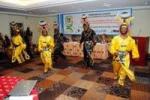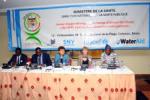Published on: 19/11/2013
 Tuesday 12 November was the first day of the 'Towards Sustainable Total Sanitation' West Africa workshop. It proved to be a real success with around 70 participants from 16 different countries coming together. About 40% of the participants come from the NGO sector, 35% from government, 20% from international organisations and 5% from the donor community.
Tuesday 12 November was the first day of the 'Towards Sustainable Total Sanitation' West Africa workshop. It proved to be a real success with around 70 participants from 16 different countries coming together. About 40% of the participants come from the NGO sector, 35% from government, 20% from international organisations and 5% from the donor community.
The workshop was officially opened by the Minister of Environment, Mr. Raphel Edou on behalf of the Ministry of Health, and the Minister of Decentralization, Mr. Isidore Gnonlonfoun. This was followed by some wonderful vibrant ethnic dances from Benin which helped set the mood for the day.
The introduction of the workshop itself was then given by Juste Nansi, the IRC director in Burkina Faso, who focused on the objectives and programme overview per day. Throughout the day, a number of presentations took place, presenting successes and challenges around programme implementation. The presentations focused on three aspects:
 Records of CLTS implementation in the field with a focus on Ghana, Niger, Sierra Leone and Burkina Faso;
Records of CLTS implementation in the field with a focus on Ghana, Niger, Sierra Leone and Burkina Faso;In between the presentations, discussion took place around institutional, political, social and technical issues related especially to the sustainability of the work currently being done. All in all, it was very fruitful day with much sharing and learning. This would lead well into the second day where more focus was placed on ways to integrate programmes into sustainable sanitation services.
Day 2 and 3 were organised around the concept of a service. Following the introduction of what a sanitation service should encompass, remaining presentations focused on two broad themes; institutionalization and financing.
These experiences shared allowed the launch of a collective reflective effort to come up with concrete actions to implement sustainable sanitation services. The set-up of such services does not rely only on finances and institutions, but also on social and technical aspects. To pursue the dialogue on these themes, team exercises were set up in the form of a World Café. The solutions identified, developed and validated will be shared with a wider audience through the publication of a booklet by the end of 2013.